Gender inequality and women’s rights in South Sudan are still a great issue. According to UNESCO, the literacy rate in South Sudan for women aged 15+ was 28.9% in 2022, compared to 40.3% for men. Many charities and missionaries are working tirelessly to improve women’s rights in that country.
Sr Jacinta Prunty, a Holy Faith Sister of Ireland is one of those people. She has been working with teacher training education since October 2020. Speaking with The Irish Catholic, Sr Prunty explained she went to South Sudan for four months in 2019, during a ‘sabbatical leave’ from her work as head of department in History at Maynooth University.
Sr Prunty went to the Solidarity with South Sudan Teacher Training College (STTC) as a volunteer for a semester. “I taught there from January 1 to the last day of April 2019. Then I came back to work at the university. I loved South Sudan so much [that] I resigned from my university role and went back full-time on October 1, 2020.”
She just renewed her contract to teach in South Sudan. The first contract was for three years and the recently signed one guarantees she will be there for another four. “I think what they like about us is that we’re there to stay,” the sister explained.
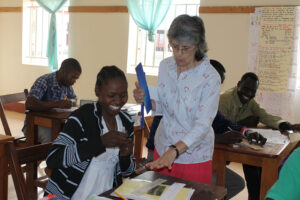
She said she went to meet the Director General for Education when she first arrived for her ministry, however, “it took me day, after day, after day of doorstepping to get to see him.” Sr Prunty went to the director’s office every day for a week.
Training
When he finally decided to meet with her, the first thing the director asked was: “Well, sister, how long are you here for?” to which she replied, “I’m here for 10 years, please God.” The second thing the director asked were Sr Prunty qualifications. “I told him I was already doing head of department and lecture and I got qualifications. ‘Sit down’, he said [and] we are the best of friends since … What they don’t like is this coming and going.”
The sister explained that she knew about the dangers in South Sudan, but she never felt safer. She “couldn’t face north, south, east or west. I didn’t know what direction I was walking and I would get a bit lost.
That means that we are part of building up the country on a solid foundation for the future. So this teacher training will continue”
“There would always be some of the others that were laughing, ‘but just ask, they will know where you’re coming from,’ and you will be escorted back to the gate of the college. [The natives are] extraordinarily welcoming, kind, appreciative.
STTC is affiliated with the University of Juba. “I’m very proud of this,” Sr Prunty said. “This took a long time, its paperwork takes forever. We were already working with them, but now we have the final thing. That means that we are part of building up the country on a solid foundation for the future. So this teacher training will continue.”
There are three teacher training colleges in that area, she explained. STTC, one supported by the Anglican Church and another which is supported by the government of Norway.
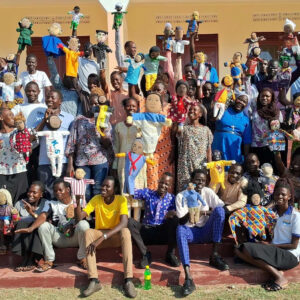
“My job has been to push this college forward into third-level structures,” she explained. “we’re not there for our own power and glory. We’re there for service and we’re there to leave it, to set it up in a way that will continue into the future. And I think we’re getting there.”
Women
The sister explained that when she arrived at the college for the first time five years ago, most of the teachers in training were men. The college principal Br Chris Soosai arrived just a few months ahead of Sr Prunty and “he moved it very strongly to bringing in more women.
“And even though everybody said it couldn’t be done, we wouldn’t get enough girls, we’d have to have a special stream for girls who are much slower or haven’t enough background, we have proved that the girls are the match of the men once they get a chance.
I think it’s probably one of the single most important achievements so far, and there has been opposition”
“Some of our best students are women and that’s very, very nice. Now we’ve made it up to the 50/50 of the intake and we’re now going for 60% girls to 40% men, and to try and push to get more girls into primary school teaching.
“Until you get more women into primary school teaching, you will not have more girls registering in school. So the women are needed to get more girls attending school.
“I think it’s probably one of the single most important achievements so far, and there has been opposition. But I think by holding firm and saying ‘no, this is the way it’s going to be’” will have results. These results can be already seen, as “we had our first female college [student] president.”
“Chris organised that one semester it will be a male president, the next semester [it] will be a female president, the next semester male,” the sister explained. However, equality is not a common thing in South Sudan “and some of the boys were so angry about this, they boycotted and there was all kind of hassle.”
Equality
Mr Soosai held firm and said “The college is committed to gender equity. This is the way we’re doing it and if you don’t like this, nobody’s imprisoned here. You can go.” Sr Prunty agreed that it could be extreme to tell the students to go, but they were determined to have equal rights for all students, independent of their gender.
“The first girl who was elected turned out to be the best president we have ever had, at least to my knowledge. Superb, tiny little girl,” the sister said.
They quote Pope Francis and Church documents, which gives them some authority to argue with the men who disagree with gender equality in the college”
The difference of having a female president, Sr Prunty explained, was that the girls now had a voice. “The girls started speaking up better, more strongly. And we thought we sorted out a few important things when we had a female president,” she said.
Working with such a focus on gender equality, one could consider the sister a feminist. “What else would I be?” Sr Prunty commented on her ‘feminist actions’. “I have had chances.
“My mother and my father gave us equal chances. My father worked with cars, I mean, I was driving trucks and cars before I joined the convent. I was 17 and I was able to drive a lorry.” “They didn’t use those words, or they didn’t talk about feminism, but they had a great, active sense of equality, so nothing would hold you back.”
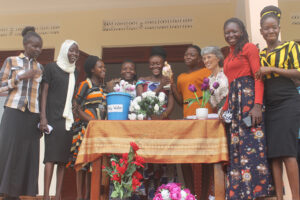
In her personal life and her career, Sr Prunty “was personally very lucky, very fortunate to have some very good mentors, men and women who could really be described as feminists, but they may never have used that language about themselves.”
Sr Prunty explained the teaching at STTC also includes “a lot of Catholic Church teaching.” She said they quote Pope Francis and Church documents, which gives them some authority to argue with the men who disagree with gender equality in the college.
“We say ‘No, no, this isn’t Western, this isn’t Europe, this isn’t Ireland. This is actually equality, respect. All of these things are coming from [the] Catholic Church teaching’, which is powerful, and it’s very difficult then for people to quarrel with this or dispute it.”
Programmes
Even though women are now making 50% of the students in the college, the mentality of the whole country is more difficult to change. To guarantee the security of these girls, they have two separate programmes.
The residential learners are girls aged around 19 to 21, who just left secondary school. “Because that makes it safer for young women…it’s very hard if you have young girls of 19/20, and then you have a load of men in their 40s.” In special cases, they admit older women, in their mid-twenties.
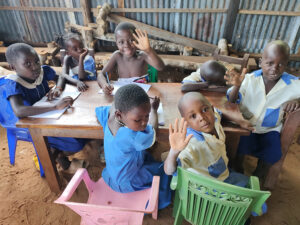
The other programme is an in-service, non-residential course, which “takes a little bit longer.” The non-residential programme is thought for older people, “especially older men. We put them towards the in-service.”
“These people are madly patriotic and these people are committed to South Sudan,” Sr Prunty explained. When they graduate most of them go back to their home villages. “They are literally going back to be teachers in very, very difficult places,” even though they are not paid to teach in those villages.
The women have very little voice, very little autonomy, very little. They have them on paper, but culturally they haven’t got many rights”
“A qualified female teacher carries a lot of status…I think that’s going to help and that will inspire little girls too.” The sister also believes that by having female teachers in their villages, little girls feel inspired to attend school, as they make school grounds safe for females.
“The women have very little voice, very little autonomy, very little. They have them on paper, but culturally they haven’t got many rights…But with the bit of education and with the status as a teacher, you can see this improving very, very much.”
Basics
Something curious Sr Prunty noticed when visiting one of these village schools is how small things, like basic needs, are improved when having female teachers in the school. “I called in and they were mad keen to show me the toilet.
“It’s the poorest place in the world and one of the girls, Theresa, had organised one toilet. Perfectly kept, perfectly clean with the padlock and she had made [it] a women’s toilet…She kept the key in her pocket and it was handed out to the girls.”
“I was just watching this and I’m saying to myself, ‘this is what makes girls able to come to school.’ The rest of the place was a disaster, but this one toilet was for the women teachers and the girls…
“This is just what you do as a woman teacher. And then you wonder, ‘why are the girls coming to school?’ Well, just have a look at the toilet situation and see if there’s any females on the staff.”
If you come with a good heart and you come with an openness to learning, you can still learn. You can still share. You can still serve and you, yourself will be enriched”
This experience working in South Sudan “certainly changed” Sr Prunty “in a lot of ways”. “I’ve become more patient,” she said. “I realised, I suppose, the things we have in common.”
“If you come with a good heart and you come with an openness to learning, you can still learn. You can still share. You can still serve and you, yourself will be enriched massively,” she said. “Even if you come old as I did. I was 58 when I first came, and then I was 60 when I came on my full-time contract.”


 Renata Steffens
Renata Steffens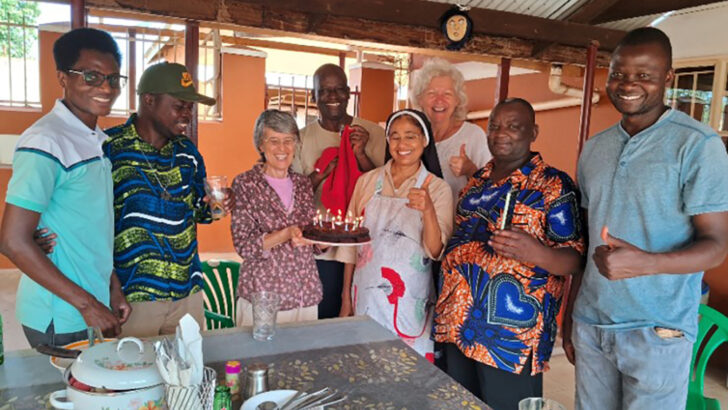 The community members (brothers and sisters) celebrate with Sr Prunty her birthday on June 2024. Photo: Sr Jacinta Prunty.
The community members (brothers and sisters) celebrate with Sr Prunty her birthday on June 2024. Photo: Sr Jacinta Prunty. 